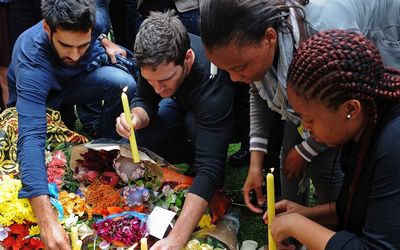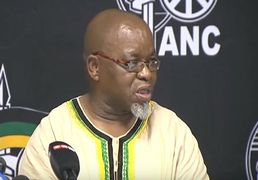THE world stood still on Thursday night, pausing in awe and sadness as news of the death of South Africa’s greatest son spread around the globe.
For South Africans, Tata Madiba’s passing served, and continues to serve, as a poignant reminder of our potential for greatness as a nation because it compels us to contemplate his life and all he stood for.
The reminder could not have come at a better time. Before the news broke on Thursday night, relegating all other news to footnotes, South Africans had been spectators to unseemly public fights between Mandela’s beloved African National Congress (ANC) and Public Protector Thuli Madonsela, and between the South African Communist Party (SACP) and the National Union of Metalworkers of South Africa (Numsa), an affiliate of ANC ally the Congress of South African Trade Unions (Cosatu).
The points of tension within the ruling alliance are likely to be hotbed issues ahead of the 2014 elections. The elections mark our 20th year of democracy, a democracy for which the ANC itself, as well as Mandela and so many others fought, and which so many have now come to doubt amid the morass of corruption and misgovernance that have come to characterise the administration led by President Jacob Zuma.
The spat between the ANC and Ms Madonsela over renovations to Mr Zuma’s Nkandla residence involved accusations and insinuations over who had leaked damning information on Mr Zuma’s alleged complicity in the irregular spending of taxpayers’ money on the upgrade.
The ANC, fearful of the effect Nkandla is having on its image and on its prospects in the next election, has accused Ms Madonsela of leaking the information herself, while she in turn blamed government officials, whom she rightly points out were given access to the Nkandla files made available to the Cabinet’s now-notorious "security cluster".
But the underlying current in the ANC’s response was that the party was concerned about the impact of the controversy on its 2014 election bid.
It was clear that even though Mr Zuma himself was not being investigated, the spending on his own private residence, apparently going far beyond security upgrades, seems certain to taint the image of the president and by extension his party.
Typifying the coarsening for South Africa’s political discourse, and the abandonment of high ideals in favour of the pursuit of wealth and power, the SACP-Numsa show degenerated to new lows when the union and the party shrouded their fight in allegations of corruption against the leaders of opposing organisations. Numsa cast aspersions on the SACP’s finances and the SACP retaliated, intimating that Numsa general secretary Irvin Jim and his deputy, Karl Cloete, were dabbling in the union investment company.
The tit-for-tat pettiness barely masks the deep divisions that have emerged, and widened, in the tripartite alliance, with Numsa set to decide at a special national congress in two weeks’ time whether it will throw its support behind the ANC in the 2014 polls.
On the surface, at least, Numsa’s frustration with widening poverty, inequality and unemployment, and its belief that its ally, the ANC, is not taking the right economic policy decisions to address this, lies at the heart of the spat. Beneath the surface, though, the battle for the heart and soul of the worker movement is tearing the movement apart, as it confronts the question of whether it will become the "sweetheart" union in the ruling alliance, or an independent workers’ movement that represents workers’ interests in a way that may at times put it in opposition to the ANC.
Numsa on Friday was weighing up whether to proceed with the special congress in the wake of Mandela’s passing. In all likelihood, the gathering would go ahead as planned, the union said.
Both these issues weighed on those paying their respects to Madiba at his Houghton home.
Mlamli Futshale, 50, from the Eastern Cape, raised the economic challenges facing our country as an issue he believed we should address to live up to our former president’s expectations.
Another was protecting our democratic institutions, as Mandela gave his life so that we could have them. "We need selfless, focused leaders; Tata Madiba formed a culture of leadership that defined an agenda of selflessness," he said outside the Houghton home.
Mr Futshale said Mandela’s passing was sad but brought renewed hope for the future, after most had forgotten the values he sought to impart to us during his brief term in office. Perceptions of corruption and divisions had caused people to lose faith.
"The threat for a long time has been a loss of hope. Tata passing makes us want to do better again, so that he gives us his smile, that very smile we know from up there," he said.
The grit of South African politics has halted. The ANC has cancelled an ordinary sitting of its top brass, where it was expected to discuss its troubled labour ally, Cosatu. Its national list conference has been postponed, putting on ice, for now, the selection and wrangling over Cabinet positions after 2014.
Opposition parties are praising the man who pledged lifelong allegiance to their nemesis in Parliament.
Government business is now solely focused on preparations for paying tribute to Madiba. But the test of the nation’s sincerity in paying tribute is the manner in which we return to and approach those issues that have divided us and left us hopeless.
"Tata left us wisdom," said Mr Futshale.
Let’s use it.

Mourners light candles in tribute to former president Nelson Mandela outside his home in Houghton, Johannesburg, on Friday. Picture: GCIS
THE world stood still on Thursday night, pausing in awe and sadness as news of the death of South Africa’s greatest son spread around the globe.
For South Africans, Tata Madiba’s passing served, and continues to serve, as a poignant reminder of our potential for greatness as a nation because it compels us to contemplate his life and all he stood for.
The reminder could not have come at a better time. Before the news broke on Thursday night, relegating all other news to footnotes, South Africans had been spectators to unseemly public fights between Mandela’s beloved African National Congress (ANC) and Public Protector Thuli Madonsela, and between the South African Communist Party (SACP) and the National Union of Metalworkers of South Africa (Numsa), an affiliate of ANC ally the Congress of South African Trade Unions (Cosatu).
The points of tension within the ruling alliance are likely to be hotbed issues ahead of the 2014 elections. The elections mark our 20th year of democracy, a democracy for which the ANC itself, as well as Mandela and so many others fought, and which so many have now come to doubt amid the morass of corruption and misgovernance that have come to characterise the administration led by President Jacob Zuma.
The spat between the ANC and Ms Madonsela over renovations to Mr Zuma’s Nkandla residence involved accusations and insinuations over who had leaked damning information on Mr Zuma’s alleged complicity in the irregular spending of taxpayers’ money on the upgrade.
The ANC, fearful of the effect Nkandla is having on its image and on its prospects in the next election, has accused Ms Madonsela of leaking the information herself, while she in turn blamed government officials, whom she rightly points out were given access to the Nkandla files made available to the Cabinet’s now-notorious "security cluster".
But the underlying current in the ANC’s response was that the party was concerned about the impact of the controversy on its 2014 election bid.
It was clear that even though Mr Zuma himself was not being investigated, the spending on his own private residence, apparently going far beyond security upgrades, seems certain to taint the image of the president and by extension his party.
Typifying the coarsening for South Africa’s political discourse, and the abandonment of high ideals in favour of the pursuit of wealth and power, the SACP-Numsa show degenerated to new lows when the union and the party shrouded their fight in allegations of corruption against the leaders of opposing organisations. Numsa cast aspersions on the SACP’s finances and the SACP retaliated, intimating that Numsa general secretary Irvin Jim and his deputy, Karl Cloete, were dabbling in the union investment company.
The tit-for-tat pettiness barely masks the deep divisions that have emerged, and widened, in the tripartite alliance, with Numsa set to decide at a special national congress in two weeks’ time whether it will throw its support behind the ANC in the 2014 polls.
On the surface, at least, Numsa’s frustration with widening poverty, inequality and unemployment, and its belief that its ally, the ANC, is not taking the right economic policy decisions to address this, lies at the heart of the spat. Beneath the surface, though, the battle for the heart and soul of the worker movement is tearing the movement apart, as it confronts the question of whether it will become the "sweetheart" union in the ruling alliance, or an independent workers’ movement that represents workers’ interests in a way that may at times put it in opposition to the ANC.
Numsa on Friday was weighing up whether to proceed with the special congress in the wake of Mandela’s passing. In all likelihood, the gathering would go ahead as planned, the union said.
Both these issues weighed on those paying their respects to Madiba at his Houghton home.
Mlamli Futshale, 50, from the Eastern Cape, raised the economic challenges facing our country as an issue he believed we should address to live up to our former president’s expectations.
Another was protecting our democratic institutions, as Mandela gave his life so that we could have them. "We need selfless, focused leaders; Tata Madiba formed a culture of leadership that defined an agenda of selflessness," he said outside the Houghton home.
Mr Futshale said Mandela’s passing was sad but brought renewed hope for the future, after most had forgotten the values he sought to impart to us during his brief term in office. Perceptions of corruption and divisions had caused people to lose faith.
"The threat for a long time has been a loss of hope. Tata passing makes us want to do better again, so that he gives us his smile, that very smile we know from up there," he said.
The grit of South African politics has halted. The ANC has cancelled an ordinary sitting of its top brass, where it was expected to discuss its troubled labour ally, Cosatu. Its national list conference has been postponed, putting on ice, for now, the selection and wrangling over Cabinet positions after 2014.
Opposition parties are praising the man who pledged lifelong allegiance to their nemesis in Parliament.
Government business is now solely focused on preparations for paying tribute to Madiba. But the test of the nation’s sincerity in paying tribute is the manner in which we return to and approach those issues that have divided us and left us hopeless.
"Tata left us wisdom," said Mr Futshale.
Let’s use it.














 News and views on the death, and life, of former president Nelson Mandela, with
tributes and photographs
News and views on the death, and life, of former president Nelson Mandela, with
tributes and photographs












Change: -0.47%
Change: -0.57%
Change: -1.76%
Change: -0.34%
Change: 0.02%
Data supplied by Profile Data
Change: -1.49%
Change: 0.08%
Change: -0.47%
Change: 0.00%
Change: -0.04%
Data supplied by Profile Data
Change: 0.75%
Change: 1.00%
Change: 0.70%
Change: 0.29%
Change: 0.81%
Data supplied by Profile Data
Change: -0.26%
Change: -1.36%
Change: -0.13%
Change: -1.38%
Change: -0.22%
Data supplied by Profile Data